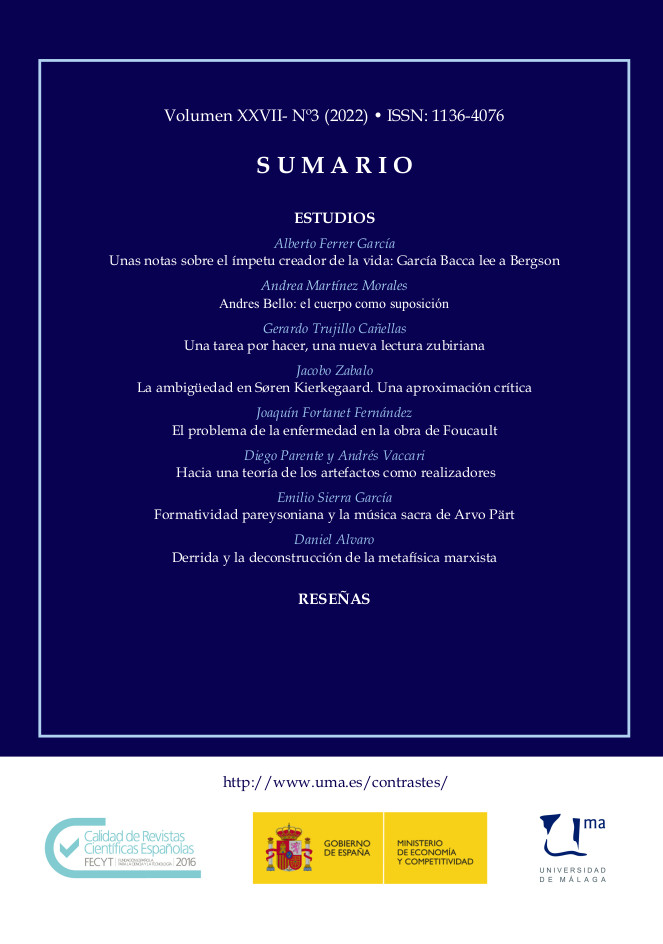Hacia una teoría de los artefactos como realizadores
DOI:
https://doi.org/10.24310/Contrastescontrastes.v27i3.13975Palabras clave:
artefacto, realizadores, materialismo, función técnica, dualismoResumen
Este trabajo presenta el esquema básico de una “teoría de los realizadores”, una propuesta programática que busca establecer una alternativa al modelo dominante en los debates actuales sobre la ontología de los artefactos. Nuestra posición es que podemos comprender mejor el mundo artificial si nos acercamos a los artefactos en términos de "realizadores" y sus correspondientes "realizaciones" en lugar de como objetos esencialmente "funcionales". Con este objetivo en mente, el artículo desarrolla en primer lugar la caracterización de los artefactos como "realizadores" y, en segundo lugar, defiende esa idea en el contexto de la ontología de los artefactos y otras discusiones en filosofía de la tecnología. La última sección reconstruye a nuestros adversarios intelectuales: una serie de dualismos que estructuran los debates actuales tales como materialidad-función, material-simbólico, estructura-función. Sostenemos que la teoría de los realizadores / realizaciones puede superar estos dualismos dominantes y ofrecer una versión mucho más rica de la vida de los artefactos.
Descargas
Métricas
Publicación Facts
Perfil de revisores N/D
Información adicional autores
Indexado: {$indexList}
-
Indexado en
- Sociedad Académica/Grupo
- N/D
- Editora:
- Universidad de Málaga
Citas
AKRICH, M y LATOU R, B. (1992. «A summary of a Convenient Vocabulary for the Semiotics of Human and Nonhuman Assemblies», en: BIJKER, W. y LAW, J., Eds., Shaping Technology-Building Society. Studies in Sociotechnical Change, Cambridge: MIT Press.
BAYSAN, U. (2015). «Realization Relations in Metaphysics», Minds and Machines, 25.3: 247–260.
BREY, P. (2005). «Artifacts as social agents», en: H. HARBERS, ed. Inside the Politics of Technology. Agency and Normativity in the Co-Production of Technology and Society, Amsterdam University Press, pp. 30-59.
BRONCANO, F. (2000). Mundos artificiales. Filosofía del cambio tecnológico. México: FCE.
BRYANT, L. (2014). Onto-cartography. An ontology of machines and media. Edimburgh: Edimburgh University Press.
ELDER, C. (2007). «On the place of artifacts on ontology», en: E. MARGOLIS y S. LAURENCE (eds.). Creations of the mind. Theories of artifacts and their representation, New York: Oxford University Press.
FERRARIS, M. (2005). Dove sei? Ontologia del telefonino, Milano: Tascabili.
HARMAN, G. (2015). Hacia el realismo especulativo. Buenos Aires: Caja negra.
HILPINEN, Risto (1992). «On Artifacts and Works of Art», Theoria, 58 (1): 58-82.
HILPINEN, Risto (1993). «Authors and Artifacts», Proceedings of the Aristotelian Society, 93: 155-178.
HÖRL, E., ed. (2017). General Ecology. The New Ecological Paradigm. New York: Bloomsbury.
HUTCHINS, E. (2010). «Cognitive ecology», Topics in Cognitive Science 2(4): 705-715.
JUVSHIK, T. (2021). «Function essentialism about artifacts». Philosophical Studies 178(2): 1-22, doi 10.1007/s11098-020-01594-w.
KROES, Peter (2012). Technical artifacts. Creations of mind and matter, New York: Springer.
KROES, Peter and MEIJERS, Anthonie (2002). «The dual nature of technical artifacts: presentation of a new research programme», Techné, (6), 2: 4-8.
KROHS, U. y KROES, P. (eds.) (2009). Functions in biological and artificial worlds, Londres: MIT Press.
LATOUR, B. (1992). «Where are the missing masses? Sociology of a few mundane artefacts», en: BIJKER, W. y LAW, J., Eds., Shaping Technology-Building Society. Studies in Sociotechnical Change, Cambridge: MIT Press.
LEMONNIER, P. (1993). Technological choices. Transformations in material cultures since the Neolithic. Londres: Routledge.
MALAFOURIS, Lambros (2008). «At the Potter’s wheel: an argument for material agency», en: KNAPPET, Carl y MALAFOURIS, L. (Eds), Material Agency. Towards a non-anthropocentric approach. Berlin: Springer.
MCGRAIL, R. (2008). «Working with Substance: Actor—Network Theory and the Modal Weight of the Material,» Techné, vol. 12, no 1, pp. 65-84.
MEILLASSOUX, Q. (2010). After Finitude: An Essay on the Necessity of Contingency. Londres: Oxford University Press.
MILLIKAN, Ruth (1999). «Wings, Spoons, Pills and Quills: A Pluralist Theory of Function», The Journal of Philosophy, 96, (4): 191-206.
MINKOWSKI, H. (2012). Space and Time: Minkowski’s papers on relativity. Montreal: Minkowski Institute Press.
PARENTE, D. (2016). «Los artefactos en cuanto posibilitadores de acción. Problemas en torno a la noción de agencia material en el debate contemporáneo», Revista Colombiana de Filosofía de la Ciencia, vol. 16, num 33, pp. 34-58.
PARENTE, D. y CRELIER, A. (2015). La naturaleza de los artefactos. Intenciones y funciones en la cultura material. Buenos Aires: Prometeo.
PRESTON, Beth (1998). «Why is a wing like a spoon? A pluralist theory of function», The Journal of Philosophy, (95), 5: 215-254.
PRESTON, Beth (2009). «Philosophical Theories of Artifact Function», en: MEIJERS, A. y otros, Eds., Philosophy of Technology and Engineering Sciences (Handbook of the Philosophy of Science, Volume 9, Amsterdam: Elsevier.
PRESTON, Beth (2013). A philosophy of material culture. Action, function, and mind, New York: Routledge.
SCHIFFER, M. (2011). Technological change. A behavioural approach. Salt Lake City: University of Utah Press.
SIMONDON, G. (2008). El modo de existencia de los objetos técnicos. Buenos Aires: Prometeo.
SLOTERDIJK, P. (2017). Esferas I, Madrid: Siruela.
THOMASSON, Amie (2007), «Artifacts and Human concepts», en: MARGOLIS, E. y LAURENCE, S. (Eds.). Creations of the mind. Theories of artifacts and their representation. New York: Oxford University Press.
THOMASSON, Amie (2009), «Artefacts in metaphysics», en: MEIJERS, A. (ed.), Philosophy of technology and engineering sciences. Amsterdam: Elsevier B.V.
TOMASELLO, Michael (1999). The cultural origins of human cognition. Londres: Cambridge University Press.
VEGA, J. (2020). «Artifactual affordances within taskscapes», Límite| Interdisciplinary Journal of Philosophy & Psychology (2020) 15: 23
Descargas
Publicado
Cómo citar
Número
Sección
Licencia
Esta revista provee acceso libre inmediato a su contenido bajo el principio de hacer disponible gratuitamente la investigación al público. Todos los contenidos publicados en Contrastes. Revista internacional de Filosofía, están sujetos a la licencia Creative Commons Reconocimento-NoComercia-Compartirigual 4.0 cuyo texto completo puede consultar en <http://creativecommons.org/licenses/by-nc-sa/4.0>
Es responsabilidad de los autores/as obtener los permisos necesarios de las imágenes que están sujetas a derechos de autor.
Los autores/as cuyas contribuciones sean aceptadas para su publicación en esta revista conservarán el derecho no exclusivo de utilizar sus
contribuciones con fines académicos, de investigación y educativos,
incluyendo el auto-archivo o depósito en repositorios de acceso abierto de cualquier tipo.
La edición electrónica de esta revista esta editada por la Editorial de la
Universidad de Málaga (UmaEditorial), siendo necesario citar la procedencia en cualquier reproducción parcial o total.










5.png)
